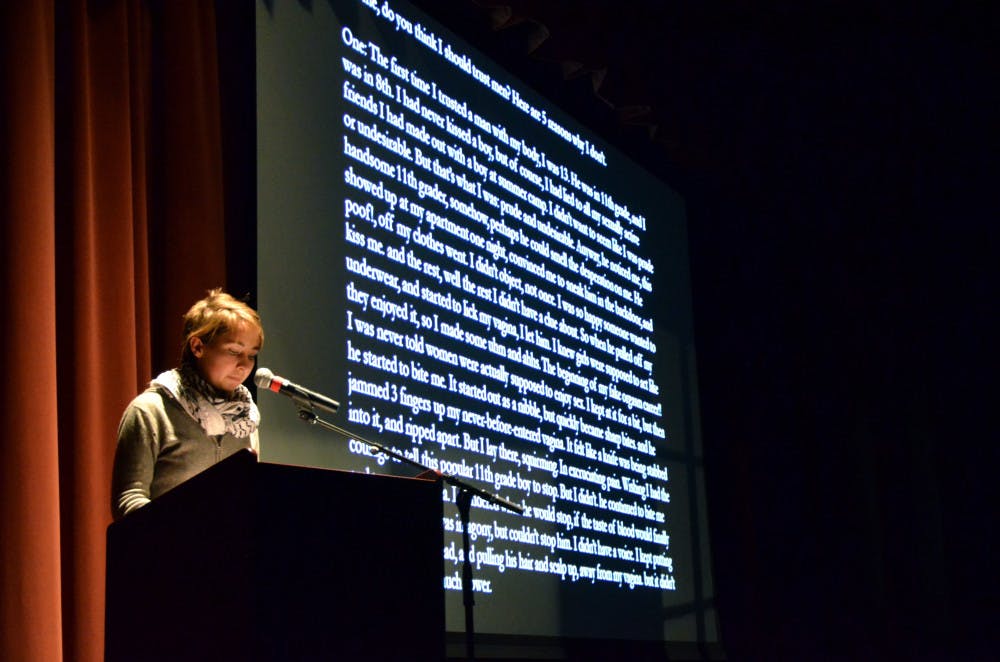Students packed McCullough Social Space to the brim on Monday evening for the third annual It Happens Here (IHH) storytelling event, with overflow seating and a live-feed held in Crossroads. Members of IHH presented fourteen accounts of sexual violence submitted by students at the College.
Luke Carroll Brown ’14 and Katie Preston ’17 began the evening with an introduction of the IHH project as well as an overview of sexual assault resources available on campus. As a means of gauging audience reactions, Post-It notes were placed on each seat so that audience members could record their immediate reactions. The Post-Its were then compiled on a board outside of the Social Space and will serve as a means of continuing the conversation about sexual assault.
The stories presented ranged from traumatic childhood experiences to weekend encounters at the College. Some were violent, others were hazy, but according to IHH attendee Leah Sarbib ’15.5, all of the stories made you think.
“The stories were well written and effective,” Sarbib said. “I think maybe more of the stories this year happened at Middlebury which I think makes more of an impact. The problem at Middlebury seems to be one of entitlement and the sense that people can’t imagine something not going their way or they that have the right to someone else’s body. It doesn’t always have to be something violent and shocking for it to be terrible and life changing.”
Twelve of the fourteen survivor accounts were submitted anonymously and read by speakers removed from the event. Two, however, read their own personal narratives.
“Reading a survivor’s story is a bit stressful and humbling, since I want to make sure I give the narrative the weight it deserves,” said Jackie Voluz ’14, who was one of the readers. “But I choose to do it because I hope that hearing the story out loud and in an environment of respect and compassion somehow helps the person heal from their experience, and makes an impact on the listeners.”
Looking toward the future, IHH members hope that the stories from the Jan. 20 event will help to build a stronger network for the prevention of sexual assault, as well as the resources available to survivors. In addition to on-campus counseling and health center resources, MiddSafe, a confidential hotline for sexual assault survivors and manned by trained Middlebury students, will launch on Jan. 24.
“This year, we tried to make some informational resources available immediately after the event, in the hopes that some people would channel their reactions into a sense of motivation, and a drive for positive change,” Voluz said. “Another major step, which was in some ways identified by themes in the stories, is to develop a more comprehensive overview of sexual assault at freshman orientation.”
Since IHH began two years ago, attendance has steadily increased and the necessity for overflow seating has come to be expected. Brown noted that IHH plans to continue holding events with the storytelling model because there is no better way to illuminate both the prevalence and the human impact of this problem than through survivors’ own words.
IHH is currently working with St. Michael’s College in Colchester, Vermont to organize their own IHH event, slated to occur in the next few weeks. The group is also working with multiple schools across the country to begin similar initiatives and expand the impact of IHH.
“We are indebted to those who submitted, as their commitment to helping our community grow is as strong as any,” Brown said. “It takes a lot of courage to publicly interrogate personal experiences with sexual violence — and I find tremendous hope in the fact that we have so many beautiful hearts and minds on this campus that want to leverage their tragic experiences to support others.”
IHH Packs McCullough Again

Comments



